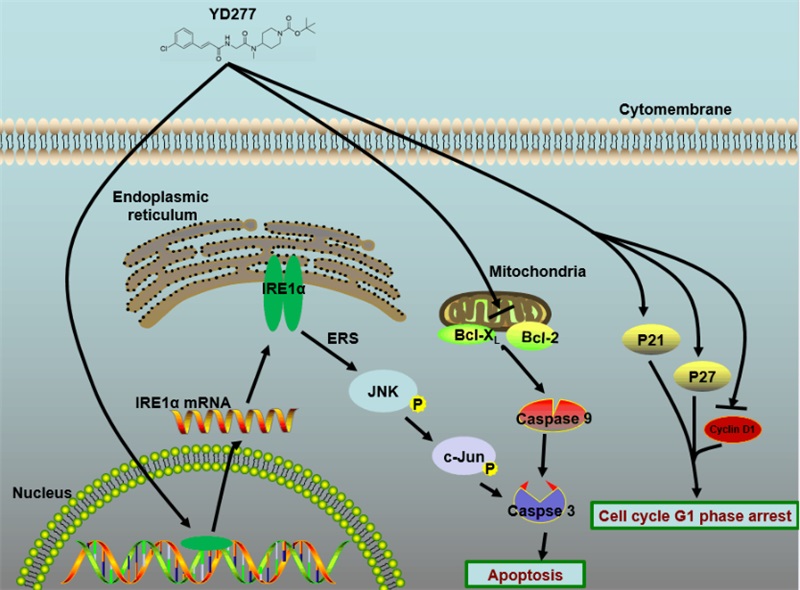
Breast cancer is a common female malignant tumor. The triple negative breast cancer (TNBC), lacks effective therapeutic targets. Patients are prone to recurrence and metastasis. Therefore, it is urgent to identify new therapeutic targets and develop effective drugs to improve the survival rate of patients with TNBC.
Previous studies have shown that transcription factor KLF5 is an effective therapeutic target for TNBC. Professor CHEN Ceshi from Kunming Institute of Zoology of Chinese Academy of Sciences and collaborators from University of Texas Medical Branch, Galveston, Texas and Southern Medical University Affiliated Fengxian Hospital, Shanghai studied a small molecule compound ML264 that can inhibit KLF5 in colorectal cancer. This study was published in Theranostics.
Based on the structure of ML264, researchers designed and synthesized a number of new derivatives. YD277 was identified as the most effective compound inhibiting the viability of TNBC cells in vitro. It was found to significantly inhibit the proliferation of TNBC cells, induced cell cycle arrest in G1 / S phase and induced apoptosis.
The function of YD277 does not depend on inhibiting KLF5. YD277 significantly increased the expression of p21 and p27, the cleavage of Caspase-3, -7, -9 and Poly ADP-Ribose Polymerase (PARP), and decreased the expression of Cyclin D1, Bcl2 and Bclxl. In functional mechanism, YD277 increased the expression of IRE1a, resulting in the activation of endoplasmicreticulum stress signaling pathway. The anti-cancer effect of YD277 was greatly attenuated by blocking the IRE1a expression.
Finally, animal experiments showed that YD277 (15 mg/kg) effectively inhibited the xenograft growth in immunodeficient mice without obvious side effects.
In this study, YD277, a derivative derived from ML264, was first reported to activate the IRE1a signaling pathway. It regulated the expression of several cell cycle and apoptosis-related proteins, inhibited the growth of human TNBC cells and induced apoptosis of cancer cells.
This study was funded by the Chinese Academy of Sciences, the National Natural Science Foundation, and the NIH of United States.

Figure: YD277 partially inhibits triple negative breast cancer by activating endoplasmic reticulum stress pathway (Image by CHEN Ceshi's Group)

86-10-68597521 (day)
86-10-68597289 (night)

86-10-68511095 (day)
86-10-68512458 (night)

cas_en@cas.cn

52 Sanlihe Rd., Xicheng District,
Beijing, China (100864)

